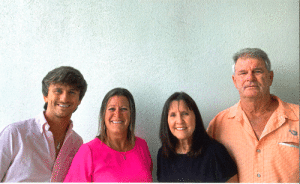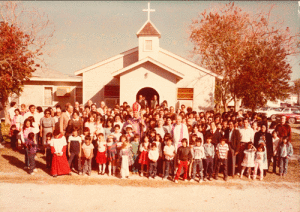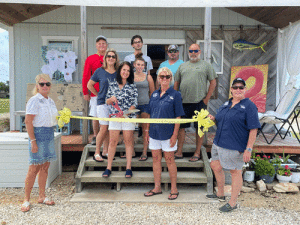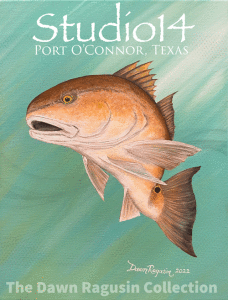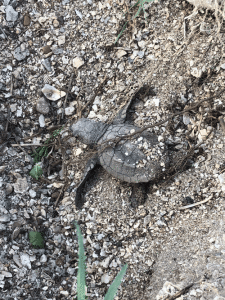
A Kemps Ridley sea turtle in its nest.
-Photo by Emilee DeForest
A First in Modern Times:
MAGNOLIA BEACH, Calhoun County, Texas – A conservation success hatched today on the shores of the Magnolia Beach in Calhoun County, Texas. A sea turtle nest containing approximately 45 hatching Kemp’s ridley eggs was discovered, and turtles successfully made their way to the water.
“This has never happened in modern times,” said Dr. Pamela Plotkin, director of Texas Sea Grant and sea turtle biologist. “Sea turtles typically nest on barrier island beaches in Texas and so seeing a turtle nest on a beach inside any bay is rare. There are many miles of unpopulated bay shoreline along Texas’ coast, so it is possible that sea turtle nesting on these shores is more frequent and undetected.”
For sea turtles, the period after hatching is a fight for survival. In their first moments of life hatchlings must quickly race from their nests in the sand to the water, avoiding predators, poaching, pollution, and other hazards.
Eggs left on the beach only have a 45 percent chance of hatching, which is why intervention from conservationists can be critical.
Fortunately, the turtles hatching on Magnolia beach had help.
The turtles were found by maintenance workers with the Calhoun County Precinct 1 Commissioner’s Office. While picking up trash on the beach, Zach Padron and Jason Gonzalez spotted approximately 25 hatching turtles and noticed that they were heading the wrong way.
Padron said he remembered learning from nature television shows that hatching sea turtles are at risk from predators like seagulls. He said, “I thought, ‘We better help them because it’s a good ways to the water’!”
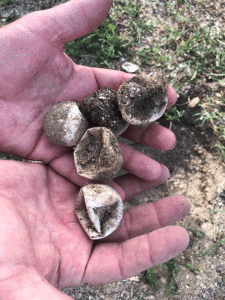
Hatched sea turtle eggs -Photo by Emilee DeForest
The workers and Commissioner David Hall notified Calhoun County Marine Extension Agent RJ Shelly.
Upon arriving, Shelly began excavating the turtle nest, under the guidance of Plotkin. He found more sea turtles that needed help emerging from the nest. Approximately 20 more turtles were found.
“Sure enough, once we started excavating, we saw more and more dig their way out,” said Shelly.
These turtles were within 10 feet of a roadway, making active monitoring necessary. Shelly and others supervised the hatching process, ensuring the turtles’ safe release into Matagorda Bay.
“We let them imprint on the sand and then stood there while they made their run,” Shelly said.
The Kemp’s Ridley is the official state sea turtle of Texas and is critically endangered. Decades of efforts from scientists, resource managers, conservationists, and others have allowed the species to begin to recover.
These conservation efforts have been ongoing in Matagorda Bay, and include a recent assessment of Matagorda Bay, sponsored by the Texas Office of the Comptroller. The assessment included acoustic tracking of turtles in the area by Plotkin and her team.
“Matagorda Bay is currently a vibrant healthy ecosystem with an abundance of sea turtles that live and feed there,” said Plotkin. “In the late 1800s there was a commercial sea turtle fishery operating there that decimated the sea turtles in the bay by the early 1900s. Signs of sea turtle recovery in Matagorda Bay are visible now and illustrate how reduced fishing pressure in concert with habitat restoration can save threatened and endangered species.”
The hatching comes at a special time. June 8-16 marks the celebration of Sea Turtle Week, an internationally recognized week that celebrates sea turtles and educates on the threats they face.
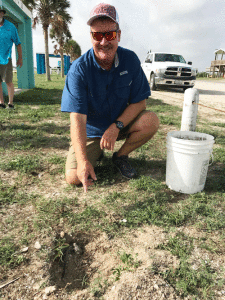
R.J. Shelly points at turtle’s nest.

